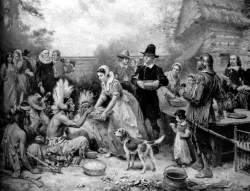 As Thanksgiving weekend comes to a close, I want to thank each and every one of you who actually care about the oft-mundane things I have to say here on my blog as well as on Twitter – bless you!
As Thanksgiving weekend comes to a close, I want to thank each and every one of you who actually care about the oft-mundane things I have to say here on my blog as well as on Twitter – bless you!
I have been very blessed myself this year with a new, wonderful husband, the best in-laws I could have been dealt and my extended families lives coming together in unexpected and unique ways – as well as employment with the the best PR firm around, Eastwick Communications (yeah, I just a teeny bit biased) in a role I love more and more every day, directing social media efforts. I have had the joy of re-connecting with old friends and making some very special new ones along the way. And lest I forget the role the outcome this election has had on my lasting hope that this country can and will restore itself to being an ideological force that others look to as an example of strength, not stupidity.
For all this I am beyond thankful – and thank you for whatever role you played; I am eternally grateful!
I leave you to consider the message behind the first presidential Thanksgiving proclamation. In 1789, President George Washington wrote:
“Now therefore I do recommend and assign Thursday the 26th day of November next to be devoted by the People of these States to the service of that great and glorious Being, who is the beneficent Author of all the good that was, that is, or that will be—That we may then all unite in rendering unto Him our sincere and humble thanks—for His kind care and protection of the People of this Country . . . for the signal and manifold mercies, and the favorable interpositions of his Providence which we experienced in the tranquility, union, and plenty, which we have since enjoyed . . . and also that we may then unite in most humbly offering our prayers and supplications to the great Lord and Ruler of Nations and beseech him to pardon our national and other transgressions . . . To promote the knowledge and practice of true religion and virtue, and the increase of science among them and us—and generally to grant unto all Mankind such a degree of temporal prosperity as he alone knows to be best.”

